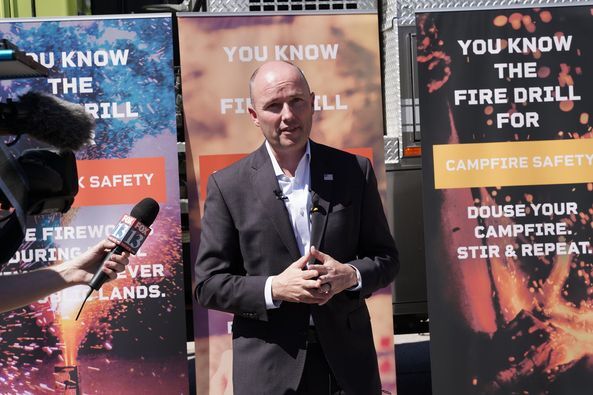Some information may be outdated.
The Bureau of Land Management has issued its annual statewide Fire Prevention Order to help prevent the risk of wildfires igniting in Utah, banning explosive material or exploding targets on BLM-managed land. Utah Governor Spencer Cox and interagency fire leadership asked the public to change their behavior to decrease human-caused wildfires at a press conference on May 26.
“The state is bracing for one of the worst fire seasons, if not the worst fire season, on record,” said Brian Steed, executive director of the Utah Department of Natural Resources, at the conference. “We’re in bad conditions, and we’re not predicted to get a lot better. Everyone here has a responsibility to preserve the resources of the state.”
Last year, over 80% of the state’s fires were caused by humans, meaning over 1,200 fires “could have been prevented,” according to Steed. Currently, 100% of the state of Utah is in a drought, with 90% in an extreme drought condition. The last water year was also the second-driest on record in Utah.
Basil Newmerzhycky, a lead meteorologist with the BLM’s Predictive Services Fire Weather Program, reported that southern Utah is most at risk for wildfires this fire season. Already almost 80% of the state — the lower two-thirds of Utah — is categorized under “exceptional drought,” which has only been seen a handful of times previously, and never in more than 10% of the state. Newmerzhycky said that June will likely be the worst month of fire season in the state, and that the threat will likely be prevalent until the rains arrive in the fall.
“It is unheard of to have several fires from a couple hundred to a thousand acres in March and April, and that’s what we got,” said Newmerzhycky. “It’s going to get much worse before it gets better.”
To combat fire carelessness and increase awareness and best practices, Gov. Cox launched the new statewide wildfire prevention campaign last week, where he urged Utahns to exercise “Fire Sense” and do their part to prevent wildfires.
The governor reported that Utah has clocked 227 wildfires so far in 2021 that have burned over 8,400 acres. All but eight of those 227 were human-caused.
“As a state, we just can’t afford to keep doing things the way we are doing them when it comes to the outdoors and fire danger,” he said. “Anyone can inadvertently start a fire, and I’m begging all Utahns right now to do their part to prevent wildfires.”
Using one’s “Fire Sense” includes being aware of equipment that could potentially cause a fire and ensuring that tires, brakes and exhaust are properly maintained. Drivers should also not park or drive over dry vegetation and check trailer chains before driving.
Cox acknowledged that inexperienced tourists are often part of Utah’s fire risk. “We are the fastest growing state, and when we add more people here, that increases the odds of someone starting a fire,” he said. “The overwhelming majority of Utah wildfires are carelessly started and 100% preventable.”
Campfires must be kept to a manageable size and never left unattended. Use the “Drown, Stir and Feel” method — drown the fire with water, stir the fire area to wet any remaining embers and feel the area with the back of your hand to ensure nothing is smoldering — to put out campfires.
If burning debris, monitor predicted weather and wind conditions and do not burn on windy days. Firearm users should use safe ammunition and targets over a backdrop free of rocks and vegetation. Keep a shovel and fire extinguisher nearby in case of spread. Fireworks are prohibited on all public lands and should only be used during legal dates and in legal areas. Those who enjoy target shooting have been asked to continue their sport at indoor ranges, as target shooting is a leading cause of wildfires during the dry months.
Interagency fire experts also advise recreators to keep an eye on Red Flag Warnings, posted by the National Weather Service, which signify warm temperatures, low humidity and stronger winds that produce an increased risk of fire danger.
“More human-caused wildfires inevitably lead to more threats to lives and property. Given Utah’s current drought conditions, it’s more important than ever this fire season to be cautious with fire and with anything that can cause fire,” said Steed. “We absolutely can’t afford to continue this trend of increasing human-caused wildfires that we have seen in the state over the last few years.”
“I encourage all Utahns to enjoy our beautiful outdoors and people who are coming from out-of-state to enjoy what makes Utah so special, but I’m asking you to think twice and please be careful,” the governor said.
Appreciate the coverage? Help keep local news alive.
Chip in to support the Moab Sun News.





